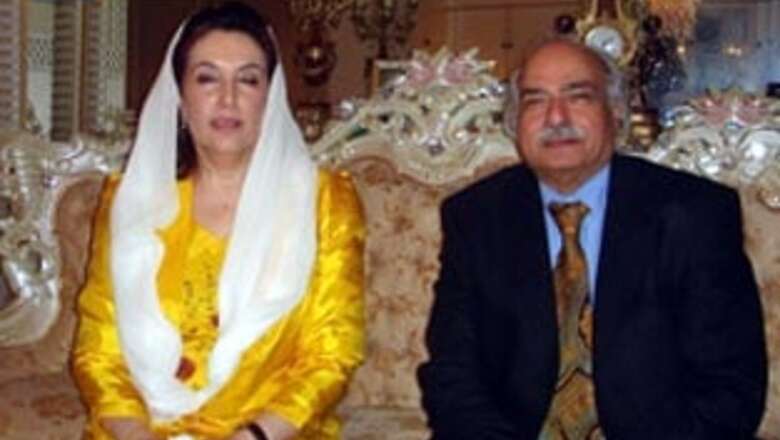
views
Wajid Shamsul Hasan is the High Commissioner of Pakistan to UK and Advisor to former prime minister of Pakistan, Benazir Bhutto. He writes about her vision of relations between India, Pakistan and the region. The views and ideas expressed in the article are his own.
London: My mind, heart and soul refuse to accept that she is no more with us. Every day that I have passed ever since she was cold-bloodedly assassinated on December 27 last year by the cruellest scum on earth it has been an unending painful agony from a wound deep down that refuses to heal. Despite application of strongest will to control--whenever I have to speak and write about her –though my eyes by now should have got dried of tears—a cascade overflows involuntarily.
Those who know me well for decades will vouch that I have exceptionally high pain endurance threshold. That does not help when I think of Shaheed Mohtarma Benazir Bhutto who I used to address in deference and profound affection as "Respected Bibi". Indeed, she was the only sister I had.
Besides many other things that I learnt from her in my life that made me what I am today, I am computer literate because of her. I will never forget the day in June 1997 when I was rushed to Rawalpindi's Armed Forces Institute of Cardiology from the notorious Adyala Jail in a precarious condition. Bibi sought special permission from the hospital commandant to see me. . Besides three books she brought a laptop—my first ever. And handing it over she caringly remarked: "I am appalled by your health condition. Inshalllah you will soon recover and be a freeman as well. You are a Capricorn and I know what they are made of." By the luckiest stroke of fate for me Shaheed Zulfikar Ali Bhutto and I share the same birthday (January 5).
Bibi spent nearly two hours in the hospital and she talked about many things including the then political situation in the country. One of her remarks was rather pertinent. "Soon both will dig their own graves and rest in peace". Looking retrospectively events later proved her prophetically correct. One of the three books that she gave me was Thucydides' book on history. "I want you to read it. I hope some day you will write history of Pakistan as you have seen it made". She also wanted me to write a book about great women that I met during my long career as a journalist.
My computer—ever since then—has become most essential part of my life. As far as she was concerned she was not only workaholic but computer addict as well. She virtually organised, ran and monitored PPP through inter-net. She would get the most classified information from the party workers spread in the nook and corner of Pakistan and who were given access to her email address. She would be informed by her "eyes and ears" who in the party was doing what. Whenever her party people would converge in London, Dubai or elsewhere to meet her—she would just drop a hint or two— to let them know—she knew "what the butler saw".
I don't know if there is any other politician in the world who used computer and internet as much as she did. She would draft hundreds of letters and statements in a week to be passed to her office in Islamabad—to be issued in the name of this or that office-bearer, leader or worker—to sustain pressure on the dictator, to rebut promptly any misleading or incorrect news, to campaign and lobby internationally to mobilise pro-democratic forces to come to the aid of people of Pakistan struggling for their inalienable right to elect a government of their choice by their vote.
Even in very personal emails too she used to reiterate her commitment to revert Pakistan to the vision of Quaid-e-Azam and Quaid-e.Awam, to the empowerment of the people as sole arbiter of power and equal citizens-- irrespective of their caste, creed or colour. Her vision of Pakistan was that of a nation-state with maximum provincial autonomy to the federating units.
She was profoundly concerned about the growing religious extremism in Pakistan. And she had pledged her life to save Pakistan from falling in the clutches of Taliban. And she—indeed—gave her blood—to nurture strength to it and nourish democracy.
Had General Pervez Musharraf listened to her sane advice following the terrorist attack on the Indian Parliament in 2001 in Delhi when she pleaded with him to distance himself from the Jihadi groups, Pakistan today would not have been pushed to such a tragic pass and cornered by the Indian coercive diplomacy despite its genuine innocence vis-à-vis Mumbai terrorist attack—as categorically upheld by the Director General of the Interpol Mr Noble who came on record in Islamabad the other day to declare that India had neither provided any evidence of Pakistan's complicity in it nor has it given any proof about the sole terrorist held by it of having come from Pakistan. There is lot of weight in the observation of independent analysts that Delhi has been using its recently acquired strategic partnership with Washington for blackmailing Pakistan. Mr Noble also gave a clean bill of health to Pakistan and said that Pakistan has always co-operated with Interpol more than other states, it has suffered most harm due to terrorism and instead oif lauding its efforts in war on terrorism, the world should stop the blame game agfainst it.
Reproduced below is an email from Bibi from Dubai dated January 2, 2006 in response to my New Year greetings. Its relevance today is because of its contents that show how confident she was that return of democracy in Pakistan was around the corner. Alas Pakistan has today a formidable democracy led by President Asif Ali Zardari as the torch bearer of her glorious legacy but when the country needed her most she is not.

















Comments
0 comment